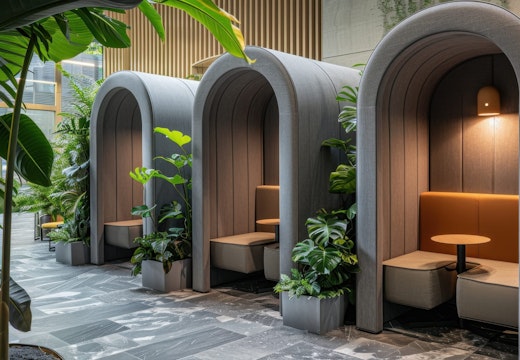Assigned desks are history but are compensations needed ?
Employees returning to the office in the hybrid era will be compelled to share a desk. Research suggests a lack of personalisation and ownership may contribute to a reluctance to return
Assigned desks, spaces that people can claim as their own ‘territory’ while they’re working at their employers’ offices, are getting to be scarcer than hens’ teeth.
Although there are all sorts of psychological benefits that flow from individual territories at work, such as elevated wellbeing, job satisfaction, performance and creativity, psychologists do not rule the universe. In the era of hybrid working, there are multiple good reasons for cutting assigned desks, many of them financial, as people come into the office for fewer days each month.
But research suggests there might also be value in taking compensatory action when people switch to sharing desks.
Decrease in personalisation
A new study by a Hungarian team led by Franko, Erdelyi and Dull has evaluated the effects of workers of sharing desks, shedding some light on this issue. The researchers report that employees at their research site could decide if they wanted to keep working in an open office with assigned seats or instead share a desk with others and have the opportunity to work at home for one day a week.
The data they collected indicated that the degree of personalisation decreased significantly not only among those who lost their permanent workstations and switched to a shared desk but also in the entire office population.
‘It might be important to create dedicated team rooms where employees can feel at home…’
The researchers found that involving employees in smaller decisions about equipment or colours can greatly increase their engagement and take over some of the functions of classic office personalisation. In shared desk systems, it might also be important to create dedicated team rooms or areas where employees can feel more at home or perhaps feel more able to shape the environment within a large building complex.
The research revealed that when employees without assigned seats are not able to participate in making decisions and lack other workplace antidotes such as dedicated team rooms or personal lockers, it is unlikely that employees will form strong bonds with their team or employing organisation.
Limited ownership
Franko, Erdelyi and Dull’s recommendations for countering the negative effects of shared desks are well grounded in previous research studies, particularly their suggestion to develop dedicated team rooms and areas. Wohlers and Hertel (2017), for example, studied employee experiences in activity-based workplaces where seats are not assigned and concluded that ‘as employees have non-assigned workstations, they have limited abilities to demonstrate psychological ownership within the office, negatively affecting wellbeing and job satisfaction at the individual level. At the team level, low levels of territoriality may negatively affect team identification, information sharing and trust within teams, resulting in low team satisfaction and performance.’
‘Low levels of territoriality may negatively affect team identification…’
Appel-Meulenbroek, Groenen and Janssen (2011) also investigated experiences in activity-based workplaces without assigned seats. They reported that to compensate for the fact that individuals cannot personalise their workplaces, team spaces should be developed to support intra-team communication and to build trust among teammates who otherwise might not spend much time near each other.
Their findings were later echoed by Kohlert (2020), who reported that ‘In non-territorial office concepts, this loss of one’s own territory should be counteracted by strengthening identity at group level’.
Office design compensations for staff switching to desk sharing should be on the table as part of RTO (return to office), but are employers thinking about this as hybrid formats are rolled out?
Sources
Rianne Appel-Meulenbroek, Peter Groenen, and Ingrid Janssen. 2011. “An End-User’s Perspective on Activity-Based Office Concepts.” Journal of Corporate Real Estate, vol. 13, no. 2, pp. 122-135.
Luca Franko, Ajna Erdelyi, and Andrea Dull. 2022. “Transformation of the Office: Territorial Behaviour and Place Attachment in Shared Desk Design.” Journal of Corporate Real Estate, https://doi.org/10.1108/JCRE-12-2021-0043
Christine Kohlert. 2020. “The ‘Human’ Workplace – Health-Relevant Factors for Learning and Working Spaces.” Proceedings, The Transdisciplinary Workplace Research Network Conference, September 16-19, Frankfurt Germany, http://www.twr2020.org
Christina Wohlers and Guido Hertel. 2017. “Choosing Where to Work at Work – Towards a Theoretical Model of Benefits and Risks of Activity-Based Flexible Offices.” Ergonomics, vol. 60, no. 4, pp. 467-486, http://dx.doi.org/10.1080/00140139.2016.1188220
Read more of the latest research insights from Sally Augustin in Research Roundup, her regular column in the Innovation Zone here.








